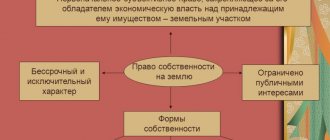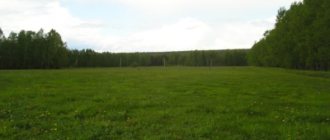Home / Real estate / Land / Ownership / Forms of ownership
Back
Published: 06/07/2017
Reading time: 17 min
0
927
Municipal ownership of land plots is a separate type of state property, under the jurisdiction and control of municipalities.
The formation of municipal lands and their provision for the use of citizens is regulated by land and civil legislation.
- The emergence of municipal land ownership
- Objects and subjects
- What lands are municipally owned?
- Types of municipal property
- Procedure for delimiting municipal land ownership
- The procedure for forming a land plot from municipal lands
- Setting the price
The concept of municipal land ownership
Municipal property is a relatively new economic institution. The first step towards separating local self-government from state power was the adoption of the USSR Law “On the General Principles of Local Self-Government and Local Economy in the USSR” on 04/09/90. The independence of municipalities at the constitutional level was first enshrined in 1992.
Art. 12 of the Constitution of the Russian Federation of December 12, 1993 guarantees the independence of local self-government. Art. 130 of the Basic Law gives him the right to independently exercise the powers of the owner in relation to municipal property.
It is obvious that the basis for the real, rather than declarative, independence of a territorial community is in the economic plane. To resolve issues of local importance, funds are needed. One of the main sources of filling local budgets should be revenues from municipal lands.
This provision is especially relevant in relation to rural settlements, whose communities do not own other valuable natural resources, industrial enterprises or commercially attractive real estate. Such municipalities obtain funds by:
- transfer of land for rent and ownership to private individuals;
- independent management on land by creating unitary enterprises or participating in the activities of commercial structures as a co-founder;
- collection of land tax classified by the legislator as local (regulated by Chapter 31, Section X of the Tax Code of the Russian Federation).
In an objective sense, municipal land ownership is one of the forms of public land ownership. It may be formed due to:
- assignment of lands to the jurisdiction of municipalities by force of law;
- distinctions with state property;
- application of civil regulations.
The powers to manage municipal land property are exercised by the community directly or through self-government bodies. In a subjective understanding, municipal land ownership is a complex of powers of ownership, use and disposal recognized by the state for municipalities in relation to lands located within their territorial boundaries.
Objects and subjects
Objects of municipal property can be land plots located within the boundaries of a given municipality. Such allotments may include both lands used by private and state structures, and in common ownership (for example, lands of adjacent areas of housing cooperatives).
Subjects of municipal property are officials and organizations that directly manage and dispose of the lands of a given municipality.
Such subjects may be:
- Heads of municipalities;
- Legislative authorities;
- Divisions of the city administration;
- Unitary enterprises;
- Private organizations engaged by authorities to manage municipal lands under a contract agreement.
Managing entities carry out management functions on behalf of the municipality, but are controlled by the elected governing bodies of territorial entities.
Municipal ownership of land and its features
Key features of the institution of municipal land ownership:
- complexity, intersectoral nature;
- public nature;
- obvious similarity of the regime with the state property regime.
Legal relations in the sphere of municipal ownership of land resources have a complex system. They are simultaneously regulated by the requirements of various branches of legislation. The structure of the institution of municipal land ownership contains norms of constitutional, land, civil and municipal law. And this is not a complete list.
Local government and the bodies formed by it are public entities acting on behalf and in the interests of the territorial community.
When exercising powers in relation to land, municipalities take into account the interests of the population.
It cannot be said that this principle is implemented everywhere. However, this problem goes beyond land law. There are quite enough levers of influence on local authorities (elections, local initiatives, referendums, recall of deputies). To take advantage of them, the community must be sufficiently mature and organized.
The Russian legal doctrine considers the concept of “public property” as opposed to private property. Public ownership of land organically includes state and municipal. Both of these forms are very similar and have many similar features. Their connecting element is public interest.
Municipal land ownership is not fundamentally different from state ownership in:
- the sources of its education;
- economic content;
- management methods;
- evaluation rules;
- forms and purposes of use.
The unity of the characteristics of municipal and state property is due to the current state of development of local self-government as a whole. This model is relatively new to Russian legal doctrine and mentality.
The prevalence of state principles and the lack of independence of local self-government have led to the absence of additional distinctive features of municipal land ownership. The average person often does not distinguish between the bodies of state power and local self-government, and does not see the possibility of his participation in managing the affairs of the community and resolving land issues on its behalf.
Subject of municipal property
The legal holder of municipal property is the municipality. Based on the definition of a municipality contained in Art. 2 of Federal Law of the Russian Federation No. 31 “On the general principles of organizing local self-government in the Russian Federation”, the right of municipal ownership of land is recognized for:
- urban, rural settlements;
- municipal areas;
- city districts;
- intracity areas;
- intracity territories of cities of federal significance (Moscow, St. Petersburg, Sevastopol).
The authority to dispose of municipal land property on behalf of the territorial community is exercised by local government bodies. They also establish the rules for its evaluation for the purposes of sale. The competence of self-government bodies is determined by federal legislation and local rules - local by-laws (Articles 125, 215 of the Civil Code of the Russian Federation).
Assets that are municipally owned are assigned to municipal enterprises and institutions. The rest of the municipal property constitutes the municipal treasury.
List of lands in municipal ownership
Such a list is established by Art. 19 of the Land Code of Russia. It includes lands:
- recognized as municipal;
- the right to which arose during the delimitation of state property;
- acquired on the grounds specified by the Civil Code of the Russian Federation.
Let's look at examples of situations where municipalities acquire rights to land property by force of law. A plot of land, the ownership of which has been renounced by a private owner, by default becomes municipal property from the moment of registration of the termination of ownership in the Unified State Register.
If the lands are located within the boundaries of a populated area, the site passes to the urban district, rural or urban settlement; if on an intersettlement territory - to a municipal district (Article 19 of the Land Code of the Russian Federation). In this case, there is no question of land ownership: municipal authorities receive the land free of charge.
According to Art. 1 of Federal Law No. 244 of December 3, 2008, areas within the boundaries of resorts of federal significance, the ownership of which was registered in the Unified State Register with the state before December 26, 2008, are transferred to municipal ownership if they:
- occupied by municipally owned buildings;
- provided to self-government bodies, enterprises or organizations of which they are founders.
The procedure for forming a land plot from municipal lands
A land plot can be formed from municipally owned lands in the following cases:
- When providing a plot to a gardening or dacha association;
- To be provided to a private individual or legal entity for use;
- When allocating a site to an organization with which an agreement has been concluded for the integrated development of the territory;
- When allocating a site to a construction organization for the construction of residential buildings;
- For the construction of linear facilities;
- For the construction of municipal enterprise facilities.
The formation of a land plot from municipal lands is possible only through the adoption of an appropriate resolution of the subject of municipal property.
In most cases, such an entity is the land or architectural and urban planning committee of the local administration.
The procedure for allocating a plot of land from municipal lands into a separate plot for rent or ownership consists of the following steps:
- Submitting an application to the land committee for the provision of a plot of land for use;
- Obtaining a positive decision from the committee;
- Ordering and carrying out boundary work to allocate a land plot;
- Submission of a boundary plan to the cadastral chamber;
- Issuance of a cadastral passport for the site being formed;
- Approval of a site within certain boundaries by the land committee.
The formation of a land plot implies the allocation of its individual boundaries in such a way that the area of the new plot corresponds to that specified in the permission of the land committee.
Land surveying work is carried out by private geodetic companies or cadastral engineers with whom a contract has been concluded.
It is important to take into account that geodetic work to determine the boundaries of a site formed from municipal lands is carried out at the expense of the organization or individual who submitted an application to receive the site for use.
How to get a plot of land from the state for a third child? Read our article! All the information you need about collective shared ownership is in our material.
All questions related to building permits can be found here.
The emergence of municipal property rights to land as a result of delimitation
The situation with the delimitation of public property lands is complex, as is clearly demonstrated by the history of legal regulation of this issue. There were two federal laws “On the delimitation of…” in Russia: dated 07/06/91 No. 1550-1 and dated 12/27/91 No. 3020-1. Both have lost their power. Initially the process was organized like this:
- lists of areas with unique characteristics were compiled from undemarcated lands;
- such lists were approved by the central government.
The procedure took up to three years. The number of plots for which rights were demarcated monthly ranged from 100 to 500 units. And this is within the entire territory of the Russian Federation.
It became obvious that the use of such a mechanism would not solve the problem. Experts offered several ways out of the difficult situation, each of which had its own advantages and disadvantages. On April 17, 2006, 53-FZ was adopted, introducing changes to:
- Land Code of the Russian Federation;
- Federal Law No. 137 “On the entry into force of the Land Code of the Russian Federation”;
- Federal Law No. 122 “On state registration of rights to real estate and transactions with it.”
According to Art. 3.3 of Law No. 137, the disposal of plots must be carried out after registration of public property rights in the Unified State Register. A caveat applies: the lack of state registration of rights to undemarcated plots does not prevent their disposal. The exercise of powers of sale and gratuitous transfer in most cases is carried out by local authorities:
- Land plots located within the city district are managed by the self-government bodies of such district.
- Plots located on the territory of a settlement, in the presence of approved rules for land use and development of the settlement, are managed by the self-government bodies of the settlement.
- Self-government bodies of a municipal district dispose of: lands of inter-settlement territories (always) and plots located on the territory of their constituent settlements (in the absence of approved rules for land use and settlement development).
Undelimited lands within Moscow, St. Petersburg, and Sevastopol are, by default, managed by executive authorities. However, they have the right to delegate these functions to the bodies of intra-city municipalities.
The following point is important for the delimitation of powers. The lands transferred to the disposal of municipalities are established in a list. State-owned lands, on the contrary, are determined on a residual basis. According to Art. 16 of the Land Code of the Russian Federation, land resources that are not owned by private individuals and municipalities belong to the state.
Legal experts assess the new mechanism for land distribution positively. This approach eased social tensions and allowed citizens and organizations to formalize the purchase of publicly owned plots.
But there are also problems: the situation, written out as an exception, has grown into a general rule. Municipalities often dispose of areas of municipal property that have not been formed in accordance with Federal Law No. 221 “On the State Real Estate Cadastre”, that is, undemarcated lands.
In this case, the formation of a plot occurs on the initiative of the person who initiated the purchase or lease. The latter, in turn, is ready to spend time and resources on preparing land management documentation, only having in hand a decision on preliminary approval, that is, having actually secured consent for the future sale/lease of a plot that has not yet been formed.
Free transfer of land plots into municipal ownership
The named method of formation and transfer of municipal property plots is regulated by Ch. V.5 Land Code of the Russian Federation. The grounds for such actions are specified in Article 39.30 of this Code. In particular, the following is provided for free transfer:
- settlements and urban districts of sites located on their territory, subject to the approval of general plans of settlements and land use rules;
- municipal districts of sites located in inter-settlement areas, subject to approval of the territorial planning scheme in accordance with the Town Planning Code of the Russian Federation.
Art. 39.30 of the Land Code of the Russian Federation contains a direct ban on the free transfer of land to municipalities:
- provided by government authorities, state unitary enterprises and institutions;
- specially protected natural areas of federal significance, forest resources;
- reserved for government needs;
- within the boundaries of special economic zones;
- in respect of which a preliminary agreement has been carried out on the provision of ownership/use to a private person;
- provided by the Rosavtodor State Corporation or for the placement of federal railway transport facilities.
Sale of municipally owned land
Let's understand the terminology issues. From the perspective of civil legislation, a land plot is a thing, and the municipality is the owner, who has the right to exercise all the usual powers, including disposal. In public legal relations, a local government body acts as a subject of power. Among other things, he is authorized to transfer land for ownership or use to private individuals. Moreover, we are often talking about virgin lands, the municipal and state ownership of which is not demarcated, and the plots are not formed.
The Russian Civil Code does not provide for the possibility of transactions with such objects.
The term “sale” is also inapplicable to the legal relations under consideration because public lands are often provided to private individuals free of charge.
So, ch. V.1 of the Land Code of the Russian Federation “Provision of land plots in state or municipal ownership” regulates not only the sale, but also other cases of transfer of land from municipal ownership to private ownership. According to the general rule (Article 39.3 of the Land Code of the Russian Federation), the sale of municipal land property is carried out at auctions held in the form of auctions.
Cases of possible sale of plots outside of auction are strictly limited. This is a land purchase:
- leased for integrated development;
- transferred to a non-profit organization for individual housing development, gardening, vegetable farming, summer cottage farming;
- formed as a result of the division of a site provided for the integrated development of the territory for the purpose of individual housing development and related to public property;
- on which structures belonging to the buyer of the site are located;
- agricultural purposes to farms.
The redemption price, as well as the initial valuation of the plot put up for auction, is determined in accordance with the rules approved by the municipality (Article 39.4 of the Land Code of the Russian Federation).
The procedure for purchasing leased municipal lands
In order to carry out the procedure for purchasing a land plot that is in municipal ownership, the interested party must provide the relevant local government body with:
- passport;
- application of the established form;
- municipal land lease agreement;
- receipt for payment of state duty.
After agreement with local authorities, the following are provided to Rosreestr:
- original of the land purchase and sale agreement;
- application of the appropriate sample on the transfer of ownership;
- receipt of payment of state duty;
- receipt for payment of the cost of the land plot;
- calculation of the cost of land purchase issued by the assessment commission;
- resolution on the provision of a land plot issued by local authorities.
The applicant acquires ownership rights from the moment of registration with the relevant authorities. The processing time for documents is 7 working days.
The purchase of municipal land into ownership may be refused on the following grounds:
- when submitting an incomplete package of documents or its improper execution;
- when establishing the fact of bankruptcy/termination of activity of the buyer - a legal entity;
- when providing false information about the buyer or the land being purchased;
- if it is impossible to purchase municipal land due to its special purpose (public lands, nature reserves, lands of forest and water funds, etc.).
- The purchase of municipal land plots is not possible for non-residents of the Russian Federation.
Registration of municipal land ownership
Issues of registration of ownership of plots are regulated by Federal Law No. 122 “On state registration of rights to real estate and transactions with it.” Considering that only land plots are recognized as real estate in Russia (Article 130 of the Civil Code of the Russian Federation), registration of ownership rights to virgin lands is impossible.
Today, municipalities are not interested in forming sites and registering them as independent objects of civil rights.
Until the territorial community has decided on the future use of the land, this is not even practical. There is no point in establishing the intended purpose of a site in order to subsequently change it or to form the boundaries of an abstract object in order to then re-register the merger, allocation or redistribution.
Thus, information about municipal lands that were not previously owned and were not transferred for the use of private individuals is usually not included in the Unified State Register. And vice versa: in order to obtain such lands for ownership or use, it is necessary to initiate the formation of plots. This, in turn, requires the development of land management documentation in accordance with Federal Law of the Russian Federation No. 221 “On the State Real Estate Cadastre”.
For example, let’s consider the procedure for registering rights to a plot by the owner of a property located on such a plot:
- Registration of ownership of the building in the Unified State Register, if this has not been done previously.
- Preparation of documents for the site: land surveying, cadastral registration.
- Obtaining a cadastral plan from the land resources department or a body with a different name.
- Applying for the provision of a site to municipal property management. This body subsequently prepares an order on the formation of the plots and granting them ownership, as well as a draft agreement.
- Signing the purchase and sale agreement. Payment by the person interested in purchasing the cost of the plot. Signing the transfer deed.
- Applying for registration of the formation of a new facility at the MFC or the territorial body of Rosreestr.
Nuances
The peculiarities of the issue under consideration are related to what types of property rights exist regarding plots and how land is distributed. You should also know how to establish an existing type of property.
Distribution of land by type of ownership
The procedure for delimiting state ownership into plots is carried out in accordance with legal norms. Federal property includes plots in respect of which rights are recognized at the legislative level, or rights were formed during the delimitation of property. Also, the grounds may be prescribed in the Civil Code.
Federally owned storage facility
Regional property includes allotments that receive their status in accordance with accepted norms of law, if this happened in the process of delimitation of powers, or the grounds are specified in the provisions of the Constitution. Subject ownership includes:
- plots that are not allocated to citizens;
- where the real estate objects belonging to the subject are located;
- provided to regional authorities to conduct activities;
- classified as special protection zones;
- forest fund lands;
- areas where privatized property is located;
- if the plot is recognized as such in accordance with laws adopted at the federal level;
- if the acquisition occurred in accordance with the rules enshrined in civil law.
Municipal property
The municipality owns lands that are not owned by individuals. The grounds are presented in the law. This type of property may include lands transferred to the Ministry of Defense by the state, even if they are located outside the boundaries of the entities. Exceptions are cities of federal significance, since there is no transfer of plots to the ownership of the municipality.
Types of property rights to land
When it is necessary to evaluate a site, in all cases it initially evaluates the rights that apply to it. In theory, they indicate that property rights consist of a set of powers that can be divided. In Russia, land rights regarding plots are divided into groups:
- those that determine the ownership of land (ownership);
- use, which means the validity of a lease agreement, concession, etc.
Property rights can be transferred together with a plot of land, or as separate objects in the event of establishing a procedure for the assignment of debts or claims.
It should be said that only the rights of ownership imply the use of the allotment to the maximum extent possible. In this case, restrictions that are established by government bodies through the development of legislative acts must be taken into account.
Other types of rights to plots have some restrictions in their implementation. According to the current rules of law, there are types of rights to land:
- own;
- use established on a permanent basis;
- possession valid for life, transmitted by inheritance;
- use allocated for a certain period of time free of charge;
- rental legal relations;
- restricted use of someone else's property.
The category of other rights to plots is also considered, such as the right to conclude lease agreements, lease of land divided into parts, collateral relations, etc. Other powers related to the use of allotments are also established. ZU cannot be owned by the right of operational management or economic significance.
Land lease right
If we talk about the right of ownership to land plots, then it is expressed in the powers to use, dispose and own land. Ownership refers to the possession of real estate as one’s own, which means, for example, for organizations – reflection of property on the balance sheet, etc. You can get various benefits from using the plot, including using it yourself or selling the grown products.
A person who owns land has the right to use groundwater, minerals and other natural resources for his own purposes. When an order is considered, we need to talk about determining the fate of the allotment from a legal point of view. The owner can sell the allotment by selling, leasing, pledging or making a gift to any person.
Such persons can use the land for their own benefit in such a way that their actions do not cause harm to surrounding people and the environment. Otherwise, it will not be possible to avoid responsibility. This possibility is limited by what regime is established for the category of land to which the allotment belongs.
Recognition by the court of the right of municipal property
Methods of protecting civil rights are specified in Art. 12 of the Civil Code of the Russian Federation. Among them is the recognition of rights through the courts. A dispute over the right to land of a municipal entity can arise with any entity:
- another municipality;
- citizen, foreigner;
- organization;
- by the state.
Depending on the subject composition, the dispute may fall under the jurisdiction of a general or arbitration court. In such a case, the municipality can act as a plaintiff, defendant, or third party with or without independent claims regarding the subject of the dispute.
In relation to land litigation, the following should be considered. Property rights in Russia are guaranteed. A Art. 35 of the Constitution of the Russian Federation specifically establishes that a private owner may be deprived of property solely by a court verdict.
In order to remove from the Unified State Register data on the registration of rights to a land plot for a citizen or organization, the municipality must present a court decision that has entered into force. The court verdict is an independent and self-sufficient legal document.
The right of municipal ownership of land on the basis of a court verdict is established, for example, in the following cases:
- paid seizure of privately owned lands for public needs;
- forced alienation of lands that cannot be owned by a private owner (for example, a foreigner inherited agricultural land and did not sell it to a citizen of the Russian Federation within a year);
- deprivation of the property rights of the owner, who used them for other purposes than for their intended purpose, through his mismanagement actions led to the depletion and deterioration of the quality of agricultural land.
Author of the article
How can you find out who owns a plot of land?
In order to establish who owns the land plot, you can contact the following authorities:
- Cadastral Chamber - the owner will be determined by the cadastral number. The fastest way.
- Federal Registration Service - it contains all the data on transactions that were carried out with this plot of land.
- Rosreestr - you can get an extract with information about the owner of the land.
- Administration of the municipality.
- Tax office.
All information can also be obtained through the Multifunctional Center.










